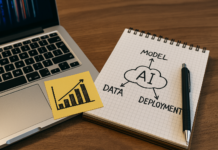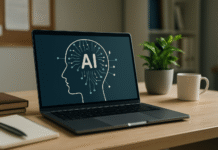Introduction
Artificial intelligence has become one of the most influential forces reshaping the business landscape in the 21st century. The emergence of AI in Startups is redefining how new ventures innovate, operate, and compete in increasingly complex markets. Startups, traditionally known for their agility and innovation, now leverage AI technologies to optimize performance, personalize customer experiences, automate operations, and unlock unprecedented levels of scalability. This convergence of AI and entrepreneurship marks a new era in which machine intelligence becomes a central element in strategy, decision-making, and growth. Understanding the impact of AI in Startups is essential for entrepreneurs, investors, and policymakers who aim to stay relevant in a rapidly evolving economy.
AI in Startups represents not only a technological revolution but also a cultural shift in how businesses are built. It introduces a new paradigm where data, algorithms, and automation drive creative problem-solving. Unlike established corporations that may struggle with legacy systems, startups can integrate AI into their business models from day one. This advantage allows them to innovate faster, reduce costs, and make data-driven decisions that enhance both efficiency and sustainability. As a result, the startup ecosystem has become a fertile ground for testing and scaling AI solutions across industries such as healthcare, fintech, retail, logistics, and education.
The Transformation of Startup Ecosystems through AI
The global startup ecosystem has undergone profound changes due to the integration of AI technologies. The rise of AI in Startups has transformed how founders approach idea generation, product development, and funding strategies. Startups today rely heavily on predictive analytics, natural language processing, and machine learning models to identify market trends, understand consumer behavior, and forecast growth opportunities. This data-centric approach has replaced intuition-driven decision-making with measurable, evidence-based insights.
Moreover, AI has redefined how startups access and attract investment. Venture capitalists and accelerators increasingly prioritize startups that embed AI into their operations or business models. The scalability of AI-powered products and services makes them particularly attractive for investors seeking exponential growth potential. This trend has led to the emergence of specialized AI accelerators and incubators designed to nurture companies focusing on applied machine learning and automation solutions. As a result, the integration of AI in Startups has become a core indicator of competitiveness in the modern entrepreneurial environment.
Another critical transformation lies in the democratization of AI tools. Cloud-based platforms such as Google Cloud AI, AWS Machine Learning, and open-source frameworks like TensorFlow and PyTorch have made it easier for startups to build AI-driven products without massive infrastructure costs. This accessibility empowers small teams to compete with established players by developing intelligent systems capable of personalization, automation, and adaptive learning. Consequently, AI in Startups is no longer a futuristic concept but an operational reality shaping industries worldwide.
The Role of AI in Innovation and Product Development
Innovation lies at the heart of every startup, and AI amplifies this creative process by enabling smarter experimentation and faster iteration. Through advanced analytics and automated workflows, startups can test hypotheses, refine prototypes, and validate market assumptions with unprecedented speed. AI tools for predictive modeling and simulation allow teams to identify product-market fit more efficiently and reduce the risk of costly failures.
For example, startups developing consumer applications use AI-driven insights to personalize user experiences in real time. In e-commerce, AI algorithms analyze customer interactions to recommend products that align with user preferences, boosting conversion rates. In healthcare, AI helps early-stage companies process medical images or analyze patient data to enhance diagnostic accuracy. These examples illustrate how AI in Startups enables innovation across diverse sectors by transforming data into actionable intelligence.
Furthermore, the integration of AI accelerates the automation of repetitive and time-consuming tasks. Startups can redirect human creativity toward high-value activities such as strategic planning and innovation. For instance, AI chatbots and virtual assistants handle customer service inquiries, freeing up teams to focus on growth initiatives. Similarly, AI-powered software in marketing automates lead scoring and campaign optimization, helping startups scale their outreach efforts more effectively. Through such applications, AI in Startups becomes a multiplier of productivity and creativity.
AI and Decision-Making in Early-Stage Companies
One of the most significant advantages of adopting AI in Startups is the improvement in decision-making processes. In the early stages of business development, decisions related to product direction, funding allocation, and market entry can determine the success or failure of a company. AI provides startups with a data-driven framework to support these critical decisions. Predictive analytics and machine learning models enable founders to identify emerging trends, evaluate potential risks, and optimize pricing or distribution strategies.
For example, startups in the financial technology sector use AI to assess customer creditworthiness, detect fraudulent transactions, and automate portfolio management. Similarly, marketing startups rely on AI to analyze customer segmentation and campaign performance metrics, helping them allocate budgets more efficiently. These capabilities reduce uncertainty and improve the accuracy of business predictions, allowing founders to make confident strategic moves.
The impact of AI in Startups also extends to human resource management and organizational growth. Talent acquisition, one of the most challenging aspects of scaling a startup, can be optimized through AI-powered recruitment platforms that screen resumes, predict candidate fit, and reduce hiring biases. Additionally, employee performance and engagement data can be analyzed through AI systems to improve retention and productivity. By leveraging these insights, startups can build data-driven cultures that foster accountability and innovation.
Educational Value of AI for Startup Founders
Beyond operational benefits, AI also plays a significant educational role for entrepreneurs. Understanding the fundamentals of AI technologies equips founders with the knowledge required to make informed decisions about product design, data management, and ethical implementation. The rise of online learning platforms and AI-focused bootcamps has made it easier for startup founders to acquire technical literacy without formal backgrounds in computer science.
AI in Startups also promotes a mindset of continuous learning and experimentation. Founders who embrace AI often develop an iterative approach to business building, where data is constantly analyzed to improve products and processes. This educational dimension aligns closely with the principles of the lean startup methodology, where feedback loops drive innovation. By integrating AI-based analytics into their learning cycles, startups can refine their strategies in real time and adapt to shifting market dynamics.
Entrepreneurs who wish to explore deeper insights into technology-driven business models can refer to Startupik Insights, a valuable resource that covers trends and strategies for modern startups. Accessing reliable educational content helps founders connect theoretical understanding with practical execution, ensuring that the implementation of AI in Startups remains grounded in both ethics and effectiveness.
Challenges and Ethical Concerns of AI in Startups
AI in Startups has become a powerful catalyst for innovation, but it also introduces new ethical and technical challenges. One of the primary difficulties lies in data collection and quality management. Startups depend on large datasets to train accurate algorithms, yet many lack the financial or technical capacity to access high-quality data. Inadequate datasets can lead to unreliable models and biased predictions, limiting the effectiveness of AI in Startups. In regulated industries such as healthcare or finance, this issue is even more critical because privacy, compliance, and data protection laws must be respected from the beginning.
Another major challenge is the shortage of skilled professionals. Founders who wish to implement AI in Startups often struggle to recruit machine learning engineers, data scientists, and AI strategists. The high demand for AI talent results in rising costs, long hiring processes, and dependence on external consultants. Without a stable technical foundation, startups risk developing AI systems that fail to adapt to new data trends or evolving market conditions. Continuous training and skill development are therefore essential for startups that rely heavily on AI systems.
Ethical concerns are also central to the discussion about AI in Startups. Machine learning models can unintentionally amplify existing social biases, resulting in unfair or discriminatory outcomes. Startups must apply transparency and accountability principles to ensure fairness in automated decision-making. At the same time, responsible handling of user data is crucial. Consumers expect clarity about how their information is collected, processed, and stored. Developing ethical frameworks early helps startups create trustworthy AI systems that align with international privacy regulations and build long-term brand credibility.
Financial and Operational Risks of Implementing AI in Startups
Integrating AI in Startups is an ambitious process that demands careful financial and operational planning. The cost of building and maintaining AI infrastructure can be significant for young companies with limited resources. Cloud computing fees, hardware upgrades, and licensing for analytics tools can consume a large portion of the budget. Startups must evaluate their return on investment carefully before scaling AI initiatives. The economic pressure can intensify if AI models take months to generate measurable value. For early-stage ventures, balancing innovation with financial discipline becomes a crucial management skill.
Operational risks emerge when startups depend excessively on automation. While automation increases efficiency, over-reliance on AI in Startups can reduce flexibility and creativity. Human oversight is vital to interpret AI outputs and correct potential errors. Founders should view AI as an augmentation tool, not a total replacement for human intelligence. The combination of human intuition and machine precision ensures adaptability during periods of uncertainty.
Cybersecurity adds another dimension to operational risk. Since AI in Startups processes large volumes of sensitive information, data breaches or model manipulation can cause severe damage. Startups should adopt robust encryption, secure cloud environments, and continuous monitoring systems to prevent attacks. Building cybersecurity awareness among employees is equally important to create a resilient organization that protects both user trust and intellectual property.
Regulatory and Legal Considerations of AI in Startups
As AI becomes integral to business operations, regulatory frameworks continue to evolve globally. Startups must stay informed about emerging policies such as the European Union AI Act and data protection laws like GDPR. Compliance ensures not only legal protection but also strengthens the reputation of AI in Startups as responsible innovators. Understanding these frameworks helps startups align their algorithms with ethical and safety standards required by investors and consumers.
Intellectual property challenges also affect AI in Startups. When AI systems generate creative outputs—like designs, text, or code—the ownership of such results becomes legally complex. Founders should work with legal advisors who specialize in technology law to protect their rights while avoiding infringement. Transparency in data sourcing and algorithm design also helps reduce the risk of litigation.
Educational resources such as Startupik Insights provide continuous updates on AI policy, compliance techniques, and ethical guidelines. By following reliable resources, startups can anticipate regulatory changes and adapt their strategies accordingly, ensuring sustainable growth.
Opportunities Emerging from AI in Startups
Despite challenges, the evolution of AI in Startups offers immense opportunities. Generative AI is revolutionizing product development by enabling startups to create prototypes, analyze data, and generate content more efficiently. These technologies allow small teams to compete with established corporations by reducing development time and increasing customization.
AI in Startups also drives sustainable innovation. Startups in agriculture, energy, and logistics use machine learning models to minimize waste, predict equipment failures, and reduce environmental footprints. This trend demonstrates how AI not only enhances profits but also supports sustainability goals. Governments and investors increasingly reward startups that align financial success with ecological responsibility.
Moreover, the globalization of AI in Startups creates new paths for market expansion. Startups can leverage AI-powered translation, localization, and customer behavior analytics to access international audiences without heavy infrastructure costs. The combination of natural language processing and predictive algorithms enables startups to tailor products for different cultures, improving customer engagement and global competitiveness.
Human-AI Collaboration in the Startup Environment
A defining feature of the modern entrepreneurial era is the collaboration between humans and AI in Startups. Instead of replacing human expertise, AI acts as an intelligent assistant that amplifies creativity, accuracy, and strategic thinking. Startups now design workflows where AI performs repetitive tasks, while humans focus on vision, empathy, and innovation. This human-AI symbiosis enhances productivity and decision quality.
In marketing, for instance, AI in Startups helps identify consumer segments and predict preferences, while human marketers design emotional storytelling strategies. In product design, AI analyzes usage data and suggests functional improvements, leaving aesthetic and ethical choices to designers. The result is a balanced approach that combines analytical precision with human sensitivity.
Leadership also evolves in this hybrid environment. Founders who integrate AI in Startups must cultivate data literacy alongside interpersonal skills. Decision-making becomes more evidence-based, but human judgment remains essential for interpreting complex social and emotional contexts. Teams that value this partnership between technology and people are more likely to innovate responsibly and sustainably.
Building a Scalable and Sustainable AI Strategy
To unlock long-term value, startups need a well-structured AI strategy. The foundation of a successful AI in Startups approach lies in aligning technology with business objectives. Founders should define measurable goals that AI can realistically enhance, such as customer acquisition, product improvement, or cost reduction. Implementing AI without clear objectives often leads to wasted resources and fragmented outcomes.
Infrastructure scalability is another key element. Startups should rely on modular systems, cloud platforms, and data pipelines that grow with their business. AI in Startups thrives in environments that promote flexibility and adaptability. A scalable infrastructure ensures that as data volume increases, performance remains stable and efficient.
Equally important is the cultivation of a learning culture. Teams that understand AI principles can use the technology more effectively and ethically. Startups should invest in workshops, knowledge-sharing programs, and partnerships with research institutions. When employees are empowered with AI knowledge, they contribute ideas that drive innovation across departments. The combination of technical skill and ethical understanding defines the next generation of AI-driven entrepreneurs.
The Future Landscape of AI in Startups and Entrepreneurship
The future of entrepreneurship will be shaped largely by AI in Startups. As algorithms become more sophisticated, they will influence every stage of the startup lifecycle, from ideation to global expansion. Startups will transition from being consumers of AI technology to contributors in the broader AI ecosystem, developing novel frameworks and sharing open-source innovations that benefit the entire community.
AI in Startups also changes investor behavior. Venture capitalists now look for companies that apply AI to create measurable impact rather than using it as a marketing trend. Startups that demonstrate transparent AI practices, explainable models, and responsible data handling attract long-term funding and strategic partnerships. The ability to balance profit with ethics will distinguish leaders from followers in the next decade.
Customer relationships will evolve as well. AI in Startups allows ultra-personalized interactions, predictive customer service, and adaptive user experiences. These intelligent systems will redefine what consumers expect from brands. Instead of static interfaces, users will engage with responsive environments that understand their preferences in real time. The startups that master this interaction model will dominate digital markets through superior customer satisfaction.
Final Conclusion
The transformation driven by AI in Startups marks a new era of entrepreneurship defined by intelligence, automation, and adaptability. By merging human creativity with algorithmic power, startups are capable of solving complex problems and discovering innovative business models. Yet, success in this domain requires more than technology alone. Ethical awareness, continuous learning, and strategic foresight are equally vital.
AI in Startups provides entrepreneurs with tools to analyze data, predict market shifts, and optimize decisions faster than ever before. However, responsible application remains essential. Startups must maintain transparency, prioritize user privacy, and ensure that AI serves humanity rather than replacing it. Those that achieve this balance will not only survive but thrive in the competitive digital landscape.
For entrepreneurs seeking deeper insights, case studies, and strategic guidance, Startupik Insights offers valuable perspectives on implementing AI in Startups effectively. By combining technical excellence with human values, the next generation of startups will lead the way into a smarter, more sustainable, and inclusive global economy.















































